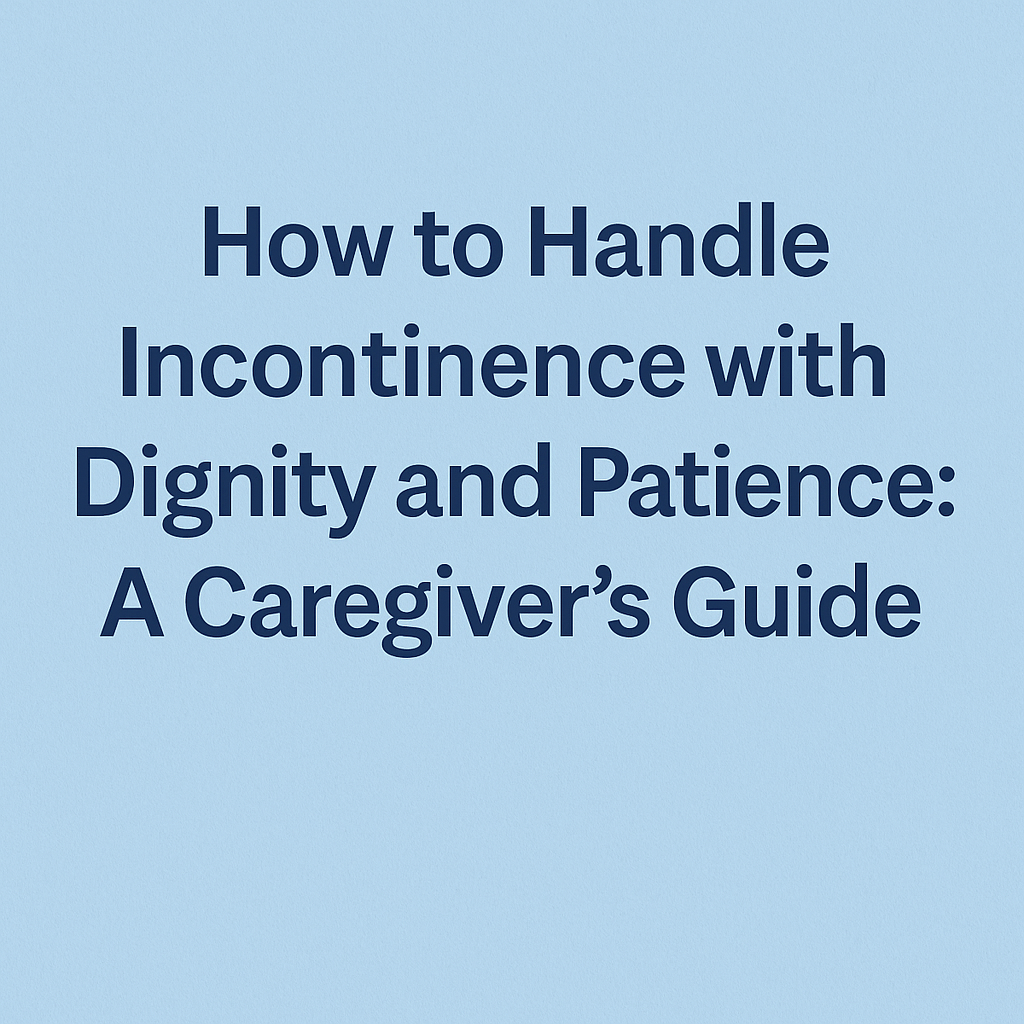How to Handle Incontinence with Dignity and Patience: A Caregiver’s Guide

Let’s be honest: no one gets into caregiving because they love cleaning up messes at 2 a.m. But here you are—showing up, again and again, for someone who depends on you.
And some days, the hardest part isn’t the physical work. It’s the emotional weight. The frustration that bubbles up when you’ve just changed the sheets… again. The guilt that sneaks in when you feel annoyed. The quiet grief of watching someone you love or care for lose control of basic things.
If you’re dealing with incontinence in a disabled patient or loved one, you already know: it’s not just about staying dry. It’s about preserving dignity. Easing embarrassment. Finding systems that work. And most of all, staying patient when patience feels impossible.
Here’s what we’ve learned from real caregivers, nurses, and family members doing this work every day.
1. Start with empathy—even when you’re exhausted
Incontinence isn’t just a physical issue. It’s deeply emotional. For the person experiencing it, it can bring up shame, fear, or a sense of helplessness. For the caregiver, it can be draining—especially if communication is limited or resistance shows up.
So before the cleanup begins, take a breath. Remember: they’re not doing this to you. Their body is just struggling.
Sometimes a small shift—like saying “Let’s get you cleaned up so you’re comfortable,” instead of “You had another accident”—can make a big emotional difference. Not just for them, but for you too.
2. Set up your environment to reduce stress
When accidents happen, the less scrambling you have to do, the better.
Keep supplies in one spot: gloves, wipes, barrier creams, clean clothes, trash bags, and extra sheets. A labeled bin or bedside caddy can save you from the 3 a.m. scavenger hunt.
And bedding? That’s where systems matter.
Most caregivers we talk to don’t have time to fully strip and remake a bed every single time. That’s why some switch to disposable layers, like PeelAways. They're soft, waterproof fitted sheets that stack in 5 layers—so when there's a mess, you just peel the top layer off. No laundry. No wrestling with corners. Just move on.
It's not a fix for everything. But on hard days, it can be the difference between a breakdown and a breath.
3. Create a routine that’s proactive—not reactive
Accidents feel more overwhelming when they catch you off guard. Try setting up a routine that makes incontinence more manageable and less disruptive.
A few caregiver-tested tips:
-
Bathroom breaks on a schedule (even if they say they don’t need to go)
-
Limit fluids a few hours before bed (without restricting hydration completely)
-
Use absorbent pads or liners on wheelchairs, couches, or favorite spots
-
Double layer the bed: One fitted sheet on top of another (or a PeelAways stack) so you can remove the top layer without a full redo
Anticipation reduces chaos. Even if the plan isn’t perfect, it helps you feel more in control.
4. Let go of perfection
It’s tempting to want everything to be clean, calm, and efficient. But the reality of incontinence care is often messy—literally and emotionally.
There will be nights when you’re short on sleep. Mornings where you feel like a maid instead of a partner or parent. Days when resentment creeps in, even if you love the person deeply.
That doesn’t make you a bad caregiver. It makes you human.
Some caregivers write mantras on sticky notes near the bed or bathroom mirror:
“I’m doing my best.”
“This is temporary.”
“I deserve care too.”
Whatever grounds you—keep it close.
5. Prioritize your own peace, even in small ways
You can’t pour from an empty cup. (We know, it’s a cliché—but it’s also true.)
Take the shortcuts where you can. Let tech help. Let disposable sheets be one less thing on your plate. Delegate a task. Accept help when it’s offered—even if they don’t do it “your way.”
You’re not weak for needing ease. You’re smart for building a system that protects you too.
6. Know you’re not alone
There are millions of unpaid caregivers in the U.S. right now doing this exact thing—changing adult briefs, disinfecting mattress covers, quietly Googling “how to prevent bedsores” at midnight. You may not see them, but they’re out there. Just as tired, just as caring.
Online forums, local respite programs, even Instagram pages dedicated to caregiving—these spaces can be small lifelines. You don’t need to vent publicly. But sometimes, just knowing someone else gets it makes all the difference.
A final word: dignity first
At the end of the day, the real goal isn’t a dry bed. It’s preserving dignity—for both of you.
Incontinence doesn’t define the person you're caring for. And caregiving doesn’t have to consume your identity either.
So go easy on yourself. Celebrate the tiny wins. And when a tool—like a disposable fitted sheet—makes your night 5% easier? Take it. You’ve earned every ounce of relief you can get.
PS: If you’ve never tried PeelAways, here’s the gist: soft fitted sheets that stack in 5 layers. Waterproof, breathable, and disposable. When one gets soiled, you just peel it away. That’s it. They’re used in hospitals, but honestly? We made them for home too. Because no one should be changing sheets in the middle of the night if they don’t have to.
Comments
0

SAVE MONEY & WATER
Professionals & Institutions save a fortune on labor/laundry.

SUPERIOR COMFORT
The first thing our customers notice is how soft our sheets are.

100% WATERPROOF
Each layer is 100% Waterproof, perfect for spills and accidents

SAVE TIME
Change the sheet in under 1 minute without stripping the bed.




Leave a comment